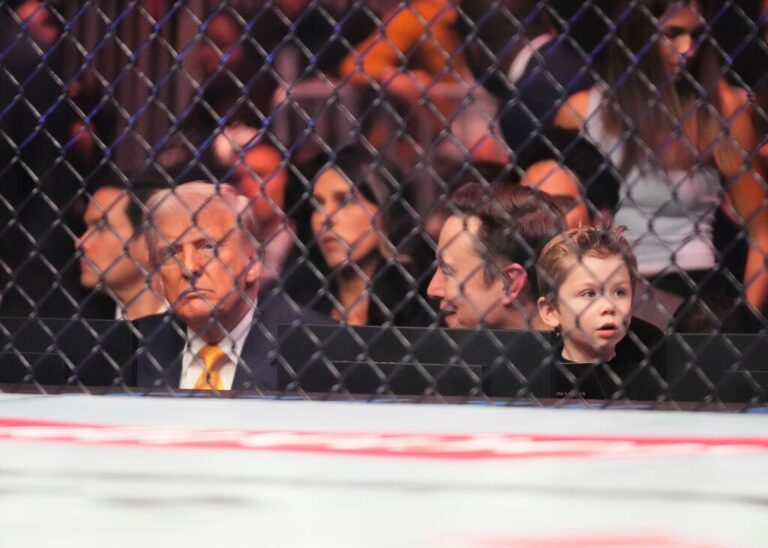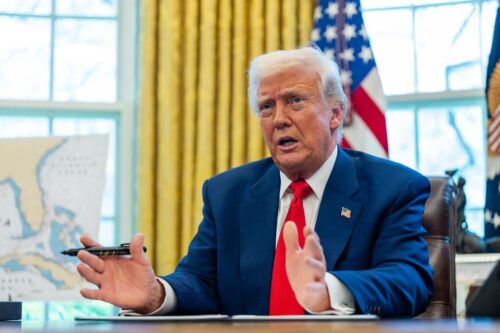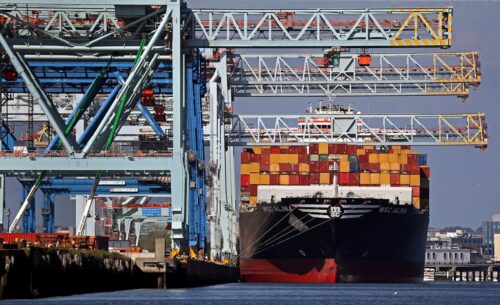This column is from Trendlines, my business newsletter that covers the forces shaping the economy in Boston and beyond. If you’d like to receive it via email on Mondays and Thursdays, sign up here.
“I used to think if there was reincarnation, I wanted to come back as the president or the pope or a .400 baseball hitter,” James Carville, Bill Clinton’s campaign general and West Wing consigliere, famously quipped. “But now I want to come back as the bond market. You can intimidate everybody.”
Everybody — even a president well-practiced in the art of intimidation.
Last week, President Trump got an Econ 101 lesson on the power of investors who buy and sell US Treasuries, the $36 trillion market that is the backbone of the global financial system.
A stinging revolt in the form of heavy selling forced Trump to delay his most aggressive tariffs or risk a 2008-style meltdown.
Treasuries usually attract money in turbulent times. But the recent sell-off — alongside a weaker dollar and volatile stocks — signaled growing doubts about US economic superiority.
“Global investors are simply shying away from US assets,” Neil Sun, a portfolio manager at RBC Global Asset Management, wrote in a note Friday.
Why it matters: Investors have put the administration on notice: De-escalate the trade war, or we’ll take our money elsewhere.
“Nobody can figure out what the rules will be five days from now, much less five years from now,” US Senator Elizabeth Warren said Sunday on CNN. “That’s a real hit to our economy.”
What happens next could shape not only the odds of a recession, but the dollar’s role at the center of global finance — a status the United States has held since World War II.
At stake are the perks of having a dominant currency used in more than half of global trade, even though the United States produces just one-quarter of global GDP.
High demand for dollars lets the government borrow cheaply, even with big deficits — a privilege that trickles down to everyday consumers. America can import more than it exports without triggering a spike in interest rates. And it can wield sanctions as foreign policy weapons.
What’s happening: The new week kicked off with investors taking a breather as they sorted through the latest tariff twists.
Trump said Sunday that high-tech products like smartphones, computers, and semiconductors would be exempt from high country-specific “reciprocal” tariffs unveiled April 2. Instead, he said, they would be covered by to-be-determined duties like those already in place on autos, steel, and aluminum.
That raised hopes that essential electronics like iPhones, laptops, and Nvidia’s blockbuster AI computer chips would be spared the most onerous import taxes.
But Trump didn’t back off his combative rhetoric.
“NOBODY is getting ‘off the hook,‘” he wrote on Truth Social.
On Monday, the Commerce Department initiated investigations into imports of computer chips and pharmaceuticals as an opening step to imposing tariffs. Meanwhile, the president told reporters he may delay levies on cars and auto parts.
He said he was “looking at something to help some of the car companies, where they’re switching to parts that were made in Canada, Mexico, and other places.”
Stock prices rose as tech companies and automakers bounced off recent lows. Treasury prices moved higher, sending yields lower. The dollar, however, fell for a fifth day.
The big picture: Despite the modest rally, Treasury investors — the biggest of which include central banks, US commercial banks, mutual funds, pension plans, and insurance companies — see more danger ahead.
“I don’t think we’re seeing dysfunction — in the sense of liquidity completely drying up in the markets — but a pattern suggestive of a loss of confidence in US economic policy,” former Treasury secretary Janet Yellen said on CNBC Monday. The pattern “is really very worrisome,” she said.
Business and consumer confidence is eroding. A further pullback could trigger a downward spiral: less spending and investment, falling stock prices, more layoffs, higher interest rates, and slower growth.
Thirty-seven percent of economists surveyed by the National Association for Business Economics put the odds of a downturn at 50 percent or higher — up from fewer than 10 percent before the trade war.
Non-US investors hold $8.5 trillion in Treasuries. Governments hold $3.8 trillion, led by Japan with $1.1 trillion and China with $761 billion.
China, which holds the world’s largest stash of foreign currency reserves, has already retaliated with tariffs and halted exports of rare earth minerals and magnets vital to auto, tech, and aerospace manufacturing.
Would President Xi Jinping dump Treasuries to turn up the heat on Trump? “They have that in their back pocket,” said Boston College economist Brian Bethune. But a mass sell-off would crater prices — including those of any US debt China still holds — so it’s unlikely.
Final thought: The powerful bond market isn’t buying Trump’s claims that tariffs will revive US factories and jobs.
The president admits rebalancing global trade won’t be painless but argues Americans will be richer in the long run. Investors are focused on the pain.
Some speculate that Trump is willing to inflict economic suffering to gain more leverage over the Federal Reserve to cut interest rates. The president denies it, yet he recently reposted a video making that case.
A showdown with Fed chair Jerome Powell — who has said officials will wait to assess the trade war impact on inflation and jobs before making further rate decisions — is possible. Trump is pushing the Supreme Court to overturn precedent restricting a president’s power to fire heads of independent agencies.
If he wins, Powell might be next.
But undermining the Fed’s independence would be a Pyrrhic victory.
Investors don’t trust a central bank beholden to politicians — and they would trample each other racing for the exits. Bond investors would be the first to bolt.
Trump backed down on tariffs, but not before scorching investors and damaging the economy‘Don’t want to overreact’: On-again, off-again tariffs put small businesses in a bindCould Trump’s trade war be his ‘Nixon shock’ moment?




Comment count: